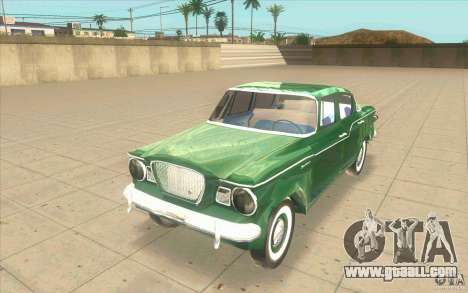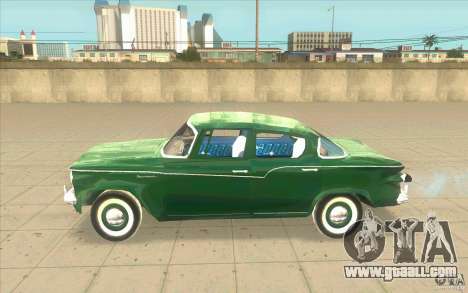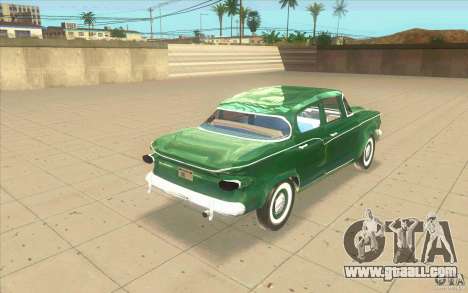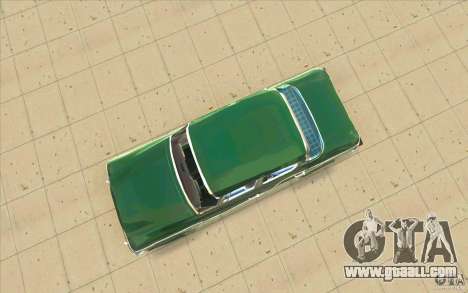Studebaker Lark 1959
1959 Studebaker Lark.
By the end of 50-ies of the owners of well-known firms in the past Studebaker was seriously thinking about not to send a retired veteran of the automotive industry", followed liquidated Packard'ohms. Why, they say, to prolong the agony? However, after weighing all "for" and "against", decided to give the "patient" last chance...
Once-thriving company Studebaker, from the town Count-band by the end of the 50's came, that is, up to the handle. Bad design, high prices, and everything else, and unimportant as alienated from cars with the letter S on the hood not only old customers and dealers, who did not want to go to the bottom together with the company-loser.
Lark (Lark).
Of course, serious investments, respectively, and a serious risk none of the leaders of the cartel Curtiss-Wright to go was not going. New Studebaker Lark ("Lark") 1959 did not differ from last year's Commander'A. However, the chief designer of the company Duncan MacRae tried my best: mercilessly cut down a quaint Keeley, shortened front, has removed the twin headlights, sophisticated decor and tinsel. Instead the machine got trapezoid "greyish" grille, window line with a little creased and rear lights-is a drop-sloping at an angle of 45 degrees chrome moldings -- unexpected, but almost invisible plagiarized from a Buick that same year.
Dropping the extra "fat" (almost a hundred kilos), "the Lark", even with relatively small motor in 259 cubic inch (4244 cm3), was enough to prompt. Maximum speed was 160 km/h And acceleration to 60 mph (96 km/h) was about 9 seconds.
A modest but elegant machine is loved by the Americans. Times were not easy. After the recession of 1958, many preferred to save money, so cheap and compact cars, which immediately and unconditionally was a Lark, suddenly became enjoy the intense demand. Sale immediately soared to 131 thousand, which was almost two times more than last year. And even next year, 1960, from the gate Studebakers plants have 126885 "larks". And this despite the emergence of new "these compacts" Chevrolet Corvair, Ford Falcon and Plymouth Valiant (see MNews no 3/2002). Trying to consolidate the company produces high-speed version of Lark first with 210-and then 225-horsepower engine displacement of 289 cubic inch (4736 cm3) from sports Hawk. Such a powerful CD easily overcame the mark of 200 km/h, being dispersed to "American" for hundreds of 8.4 seconds. In 1963, almost simultaneously with the famous Pontiac GTO, saw the light SuperLark -- Daytona R2 with an engine of the same size, only equipped with centrifugal supercharger drive firms Paxton. Power 290 "horses" well enough to easily overcome the bar to 215 km/h, as well as easily be put arrow speedometer for a 60 mph in 7 seconds. For active safety answered powerful ventilated disc brakes company Bendix, installed on the front wheels. By the way, the first in America. It is a pity that almost none of the large army of street racers did not pay for this car any attention. Moreover, in most modern books on Muscle Cars, Studebaker Daytona not even mentioned.
Lark's success is only a temporary respite. Very soon the buyers have lost all interest in the products of the saunt Band. Not helped by the intervention of the famous industrial designer Brooks Stevens. And let thoroughly reworked them Studebaker began to look like a Mercedes, new fans have not increased.
| Brand | Studebaker |
| Model | Lark |
| Car type | Passenger car |
| Car body style | Sedan |
| Drive type | Rear wheels (RWD) |
| Color | |
| Model to replace | Primo |
| Replace model files | primo.dff (1.3mb)primo.txd (1.48mb) |




